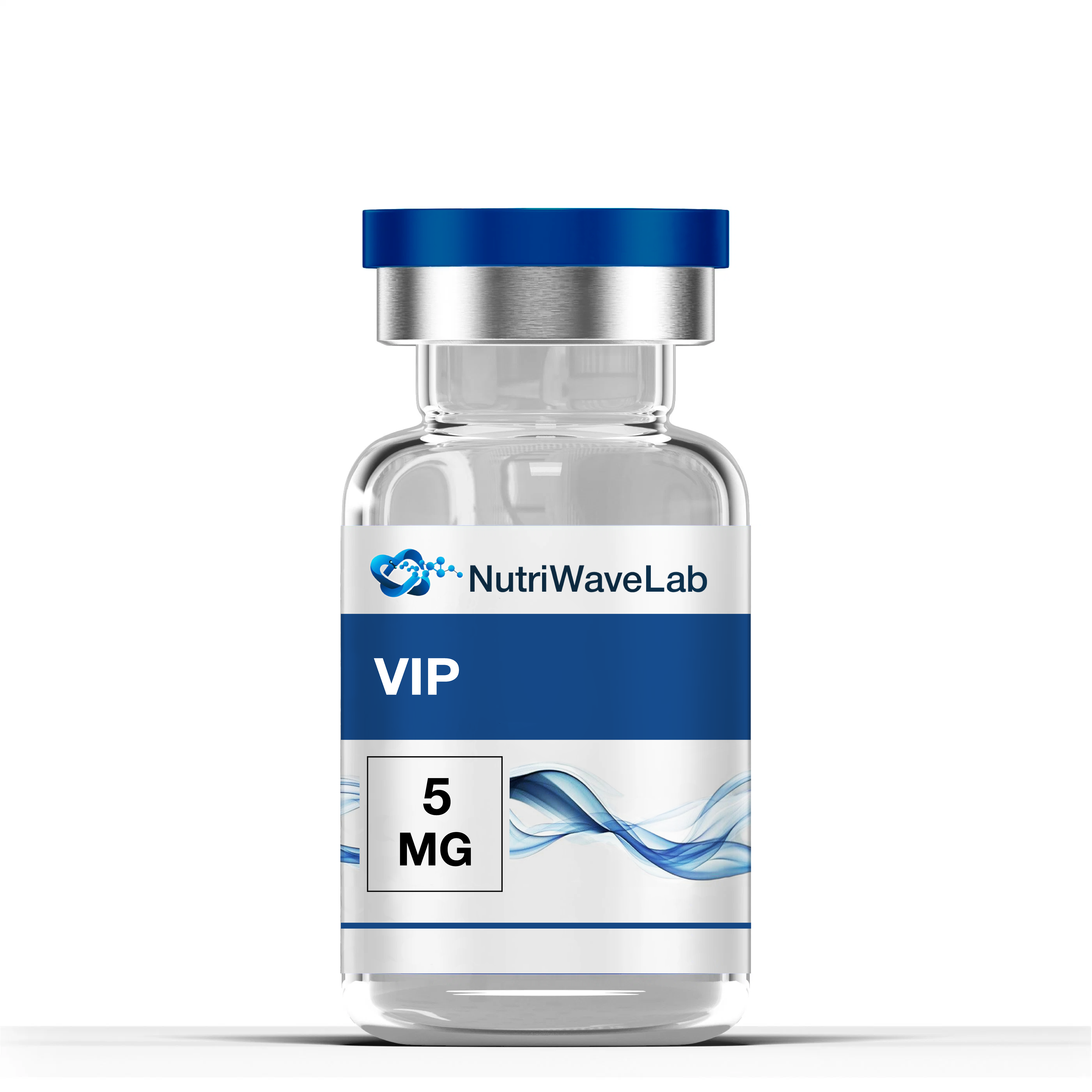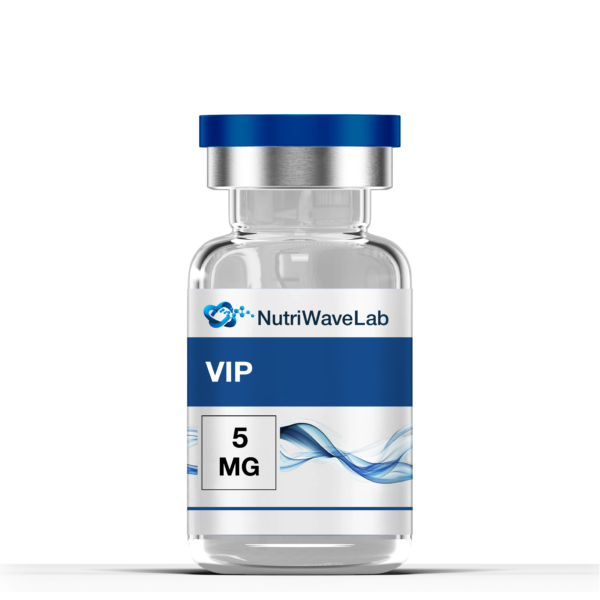VIP 5mg
$0.00
- when buying 5 units of goods 5% discount
- when buying 10 units of goods 8% discount
15 in stock
Vasoactive Intestinal Peptide (VIP) — Neuroregulatory and Immunomodulatory Research Peptide
Chemical and Biochemical Characteristics
-
Peptide Name: Vasoactive Intestinal Peptide (VIP)
-
Amino Acid Sequence: HSDAVFTDNYTRLRKQMAVKKYLNSILN
-
Molecular Formula: C147H237N43O42S
-
Molecular Weight: 3326.9 g/mol
-
CAS Number: 40077-57-4
-
PubChem CID: 16133845
-
Peptide Class: Neuropeptide / Neurohormone / Vasodilatory peptide
-
Structure Type: Linear 28-amino-acid peptide, naturally occurring in the human nervous and gastrointestinal systems
Overview
Vasoactive Intestinal Peptide (VIP) is an endogenous neuropeptide and neurohormone first isolated from porcine small intestine in 1970.
Composed of 28 amino acids, VIP is produced in the central and peripheral nervous systems, where it acts as both a neurotransmitter and neuromodulator.
It plays a crucial role in vasodilation, smooth-muscle relaxation, immune regulation, and circadian rhythm modulation.
Due to this broad physiological profile, VIP is an important molecule for studying neuroimmune communication, inflammation control, and vascular homeostasis.
Mechanism of Action
VIP primarily binds to two G-protein-coupled receptors — VPAC1 and VPAC2 — distributed across the nervous, endocrine, and immune systems.
Upon receptor activation, VIP initiates a cascade that:
-
Stimulates cyclic AMP (cAMP) production;
-
Promotes vasodilation and bronchodilation;
-
Inhibits inflammatory cytokine release;
-
Enhances intestinal secretion of water and electrolytes;
-
Modulates T-cell and macrophage activity;
-
Regulates neuronal firing in the suprachiasmatic nucleus (SCN), influencing circadian rhythm.
This dual action — neurological and immunological — positions VIP as a powerful research tool in neuroendocrine and inflammatory models.
Neurophysiological Research
In the central nervous system, VIP is found in the cerebral cortex, hippocampus, hypothalamus, and amygdala.
It modulates synaptic plasticity, cognitive processes, and memory consolidation through glutamatergic and cholinergic pathways.
Animal studies indicate that VIP contributes to learning behavior and stress resilience, and its absence has been linked to altered circadian sleep–wake cycles【1】【2】.
Furthermore, VIP interacts closely with the pituitary adenylate cyclase-activating polypeptide (PACAP) family, sharing overlapping but distinct receptor activity that allows targeted neurochemical investigation【3】.
Cardiovascular and Vasodilatory Function
As its name implies, VIP induces potent vasodilation in both large and small arteries.
This effect is mediated by cAMP-dependent smooth muscle relaxation, leading to improved microcirculatory flow and reduced vascular resistance【4】【5】.
VIP also acts as a bronchodilator, relaxing smooth muscle in the trachea and bronchi, and modulating airway tone in pulmonary research models【6】.
These findings support its use in studying vascular reactivity, endothelial signaling, and autonomic control of circulation.
Immunomodulatory and Anti-Inflammatory Actions
VIP exhibits broad immunosuppressive and anti-inflammatory effects by influencing multiple immune pathways:
-
Suppresses TNF-α, IL-6, and IL-12 release;
-
Enhances production of IL-10 (anti-inflammatory cytokine);
-
Promotes differentiation of regulatory T-cells (Treg);
-
Inhibits antigen presentation by dendritic cells【7】【8】.
These properties have drawn attention to VIP as a model compound for autoimmune and inflammatory disorder research, including conditions affecting the lungs, gut, and CNS.
Gastrointestinal Function and Homeostasis
In the gastrointestinal tract, VIP regulates:
-
Smooth muscle relaxation in the stomach and intestines;
-
Secretion of digestive fluids and bicarbonates;
-
Maintenance of mucosal barrier integrity.
Studies have shown that exogenous VIP administration in experimental settings promotes epithelial regeneration and reduces ulceration in gastric models【9】.
Its natural presence in enteric neurons links VIP to gut–brain axis regulation and microbiome-immune signaling.
Respiratory and Pulmonary Studies
During the COVID-19 pandemic, VIP analogues such as Aviptadil (RLF-100) were studied for potential lung-protective effects in severe respiratory distress.
Preliminary trials suggested that VIP’s anti-inflammatory and vasodilatory actions may help regulate pulmonary vascular tone and cytokine balance【10】.
Although clinical data remain limited, these studies have expanded scientific interest in VIP-related peptides for pulmonary and endothelial research.
Neuroprotective and Circadian Effects
VIP neurons in the suprachiasmatic nucleus are essential for maintaining circadian rhythm synchronization.
Disruption of VIP signaling has been shown to disturb sleep patterns, hormone release, and metabolic cycles【11】.
Additionally, VIP’s neuroprotective role in ischemic and excitotoxic models highlights its relevance to stroke, neuroinflammation, and age-related neurodegeneration.
Summary
Vasoactive Intestinal Peptide (VIP) is a multifunctional neuropeptide with critical roles in vascular regulation, immune homeostasis, gastrointestinal protection, and neural signaling.
Its diverse receptor pathways make it a valuable model compound for investigating:
-
Neuroimmune communication;
-
Inflammatory modulation;
-
Circadian neurobiology;
-
Vasodilation and microcirculation.
All available forms of VIP are intended solely for research and educational purposes and not for human use.
Selected References
-
Harmar A.J. The biology of vasoactive intestinal peptide and its receptors. Br J Pharmacol, 2001; 134(1): 1–10. PubMed
-
Colwell C.S. VIP neurons and circadian rhythm regulation in the SCN. Eur J Neurosci, 2011; 33(6): 1069–1077. PubMed
-
Vaudry D. et al. PACAP and VIP: neuropeptide cousins with distinct receptor specificity. Front Endocrinol, 2019; 10: 678. PubMed
-
Said S.I. Discovery of vasoactive intestinal peptide and its vasodilatory properties. Trends Pharmacol Sci, 1984; 5: 400–403. PubMed
-
Delgado M. et al. Vasodilatory and cardioprotective actions of VIP via VPAC2 receptors. Am J Physiol Heart Circ Physiol, 2002; 283(1): H196–H203. PubMed
-
Groneberg D.A. et al. VIP in human airways: localization and function. Eur J Pharmacol, 2001; 429(2–3): 197–208. PubMed
-
Ganea D. & Delgado M. Immunoregulatory effects of VIP on T cells. J Leukoc Biol, 2002; 72(1): 69–79. PubMed
-
Pozo D. et al. VIP and immune tolerance mechanisms. Trends Mol Med, 2007; 13(6): 241–249. PubMed
-
Szabo S. et al. Gastroprotective effects of VIP and related peptides. Dig Dis Sci, 1994; 39(8): 1629–1636. PubMed
-
Cooper N. et al. Aviptadil (VIP analogue) in severe COVID-19 ARDS: phase III overview. BGR / RLF-100 Clinical Update, 2020.
-
Ciarleglio C.M. et al. VIP signaling synchronizes circadian clocks in mammals. J Biol Rhythms, 2009; 24(1): 3–15. PubMed
Product Use: THIS PRODUCT IS STRICTLY FOR
SCIENTIFIC RESEARCH PURPOSES ONLY. It should only be used in laboratory
settings. All product information on this website is provided solely for
educational purposes. The law strictly prohibits introducing this product into
the body of humans or animals. Only licensed professionals should handle this
product. This product is not a drug, food, or cosmetic and should not be
improperly classified or used as such.



Reviews
Clear filtersThere are no reviews yet.